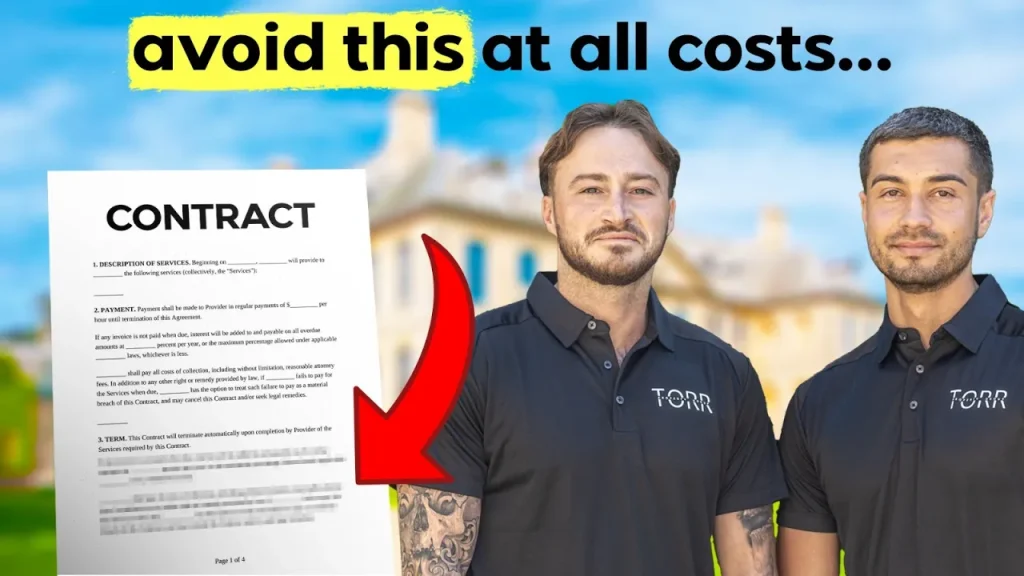It was watching Winners on a Wednesday that inspired George Torr to go into property and sign up to Samuel Leeds’ academy. Then his best friend Luke Howitt joined him. Within less than a year the two men had quit their day jobs. They live off a portfolio of rent-to-rents, while topping up their income by selling deals to investors. In March they recorded a total profit of £15,000, followed by £9,000 the following month.
‘We got a one-night booking worth £1,200 for a penthouse’
Success has come quickly to George and Luke, despite beginning their journey with very little money to invest.
George started their business in January 2023 and by the time September came around they had both left their jobs and gone into the industry full time.
Luke had previously run a commercial interiors business for 10 years with his brother and father before he stepped away from it.
As Luke describes it, he fell into the family business but didn’t enjoy it. “I did okay from it, and learned a lot which obviously you can take into this business. It was always what I thought I would do. Then when I was doing it, it just wasn't for me.’
Put simply, Luke had no passion for it. “I started at 19 with my own business. It's intense, especially when you've got your brother and your dad involved.”
Then George, who played football with him growing up and attended the same schools, came to one of Samuel Leeds’ £1 crash courses. In George’s words, it ‘blew his mind.’
“I'd never realised how quickly and easily you could get into property. I always thought people in property had loads of money and it wasn't accessible for me. Then I came to the £1 crash course and Samuel laid out all the different strategies – no-money-in deals and low money deals.”
George told Luke they had to get involved in property. Luke recalls: “He came to me just at a time when I had my own personal struggles. He just said you need a change. I thought he doesn't do anything without looking into it.”
George ‘bit the bullet’ and joined the academy. As he was about to go on the rent-to-serviced accommodation course, he spoke to Luke who then went along too.
A month later, in February 2023, the pair picked up the keys to their first SA and went live with it in March that year. A tutor on the academy put them on to the property.
“That's our best property still – the first one,” says Luke.
George and Luke took on a three-bedroom penthouse in Manchester and soon the cash tills were ringing.
“We're paying the landlord £2,700 a month. So, we can fetch a pretty high nightly rate. We're making around £1,200 a month off it,” explains George.
Their yield from it was bumped up by receiving a one-night booking worth £1,200 last June.
Afterwards they took on another high-end property in Manchester, recognising that even though they pay a premium rent it allows them to charge a premium nightly rate.
“The first two were high-end properties but instantly we saw the return,” Luke points out.
In a saturated market, where there is a lot of demand but also a lot of supply, George says they need to make their accommodation stand out from the competition.
Before taking on any rent-to-SA deal the pals research the market to find out what the average nightly rate is in the area for a comparable place. This includes looking at sites like Airbnb and booking.com
“If our property can look better than theirs, we know we could achieve that nightly rate,” says George.
The entrepreneurs work on the principle that even if it is half empty in a month, but they are still not losing money – or it is only producing a small profit – then it is a good deal.
“If we’re charging a high nightly rate, anything after 50 per cent, when you're breaking even, is pure profit. We're averaging around 80 to 85 per cent occupancy most months,” adds George.
They usually require a minimum booking of four nights in the week for the penthouse to avoid attracting partygoers. Their target market is contractors, relocators and visitors to the city.
“On the weekends we want to make the most out of people coming up for a night who are going to splash out and hit those high nightly rates,” Luke says.
“We’re happy to take one-night stays when you are hitting £1,200 for a night. We understand the risk that comes with it, but we have the systems and an amazing cleaning team in place that will take care of that.”
During the week the rate is lower.
Seven rentals generate a monthly cash flow of up to £25,000
George and Luke now have seven properties in their rent-to-rent portfolio which generate a monthly revenue of £22,000 to £25,000.
“We're very disappointed if we don't hit a profit of £5,000, even in the low season. Just coming into the high season now I think we'll be close to the £7,000 mark,” anticipates Luke.
The two partners share their takings, supplementing their income with deal selling.
From the outset they wanted to give up their jobs which gave them a sense of urgency. “We couldn't just dip our toe in,” says Luke. “We had to be trying to scale as quickly as we could.
“We came on the ACPP (Accelerated Coaching Performance Programme) in February. Since then, we've started to take on management properties. We've got another two that we're about to take on over the next few weeks.”
George and Luke thought they needed to expand their rent-to-rent business to a level where they could save money to then tackle buy, refurbish, refinance ventures.
However, in a one-to-one with Samuel Leeds at the ACPP he advised them against saving their way to becoming rich because it took too long.
So, Luke and George revised their strategy by securing two investors who are prepared to put £80,000 to £90,000 between them into a BRR project.
George says: “We'll buy the property. We'll add value to it, refinance it and pull most of our money out, if not all depending on the deal. Then we'll rent it out as serviced accommodation or as an HMO.”
On the deal selling side the businessmen are selling two investment opportunities on average every month which nets them £6,000 to £7,000.
“Our best month in profit was £15,000 which was in March,” says Luke. “Then we followed that up in April with a profit of £9,000.
“Some months it can vary because you're lining deals up that take a bit of time to complete. But the rent-to-rents in the background are guaranteeing us £5,000 which we know we can live off.
“Everything we make on top of that is where we start to build our wealth.”
Luke found the biggest challenges initially were identifying properties and dealing with landlords.
“Trying to find properties isn't easy. That's why people pay for deals. We've had a lot of people approach us and say I want to get into deal sourcing, with no training, and asking for advice.
“We'll happily give people tips, but you need the training to know how to secure that deal, how to speak to an agent and then how you adapt that to speak to a landlord – two completely different things.”
Persuading some landlords to buy into the rent-to-rent concept is the ‘hardest part’ as some have had bad experiences with untrained operators.
“I had this problem the other day,” reveals George. “I was on the phone with a landlord and pitched a company let style agreement. Straight away [it was] just a blunt ‘no, had five others, done this before and awful experience, not interested.’
They agree with their mentor that without training it is easy to lose money if you negotiate a rent-to-rent arrangement and have not done your due diligence properly.
“If you get your figures wrong, you're going to be losing money every month and that's the biggest nightmare possible,” warns George.
“There's a lot more to it than getting a property and just sticking it on online travel agents. It
doesn't work like that. You need to do research. You need to make sure it's staged properly.”
“Also, you get people who think you can go to IKEA, get nice ornaments, and put them in any apartment or any property in any location and you're just going to get bookings,” says Luke. “They're not realising that you still need to keep an eye on your nightly rate. You need to make little adjustments to increase your chance on the algorithm.”
Having the right type of tenancy agreement is crucial too. It must be a company let or the arrangement would be regarded as subletting which is not permitted.
There are other pitfalls to be aware of. If there is no break clause in the contract, the renter cannot withdraw from a long-term lease, leaving them out of pocket potentially.
Luke believes this is why the training is so valuable. “I'd done a flip before. I thought I knew the basics, but it's not that simple. There's so much that can trip you up if you don't know or at least reach out to people who do know.”
George and Luke charge a deposit so that if guests cause any damage, they can recover the cost of fixing it, using Stripe, an online payment system. The customer is charged only if a repair is necessary.
‘The freedom having this sort of business gives you is unbelievable’
The year-long academy programme gave Luke and George the foundations they needed to build a successful real estate business.
It took time to work out their prices for individual properties, and they thrived on being able to ask for advice.
“I don't think I’ve ever asked a question in a chat or to a mentor where I felt stupid asking the question.
“Without that we probably wouldn't have made it to the second property because we had teething problems with the first one. It's high rent and there were definitely times where we thought, what have we done here?” admits Luke, adding:
“But in the end, it's worked out to be a brilliant property for us and it's helped us now to quit our jobs and have our own business, financially free.
“We love what we do, so we work a lot. Even if we're out on the golf course the phones are there all the time. The network's been massive for us.”
For George his life has been ‘flipped on its head.’ “The freedom having this sort of business gives you is unbelievable. In my last job I was up at 5:30am and not home till six o’clock at night.
“By the time you've had dinner you want to go to bed because you’ve got to get up early, whereas now I wake up on my own terms, work for the rest of day and then when I'm done enjoy my free time.”
Watching Winners on a Wednesday episodes stretching back six years convinced George to invest in the academy, and he and Luke went on to appear in the series themselves.
George concludes: “Samuel keeps having students, week after week, showing their success. I think that speaks for itself. I thought if they're doing it, why can't I do it? With the knowledge, [it’s] kind of a no-brainer.”
George and Luke’s tips
- The fastest way to replace an average salary through property with no experience is to get educated as quickly as possible. Then you know the strategies you can go into with no money or low money.
- Co-sourcing is a great way to start. You get trained in how to find a deal. Then you move it on to a deal sourcer who sells it to an investor, and you split the fee.
Samuel Leeds verdict
“George and Luke didn’t have a big pot of money to start with and they’ve quickly achieved success through two strategies. They’ve done very well and I’m proud of them both.”






